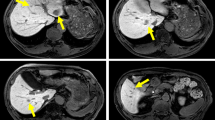Abstract
Cancer-associated thrombosis is known as Trousseau syndrome (TS). Here, we report 4 cases of TS associated with advanced breast cancer that caused central nervous system (CNS) vascular events. All 4 patients experienced sudden onset of CNS symptoms. Imaging revealed multiple brain infarctions or intracranial hemorrhage and all 4 patients had leptomeningeal or brain metastasis. Laboratory findings showed hypercoagulability at diagnosis of TS. Of the 4 patients, 2 patients were treated with unfractionated heparin, while 2 patients could not undergo anticoagulant therapy. In all patients, once the TS occurred, the CNS symptoms progressed rapidly and the prognosis was very poor, 3 patients dying within about a month of diagnosis of TS. Therefore, the predictive factors of TS are important and standards and guidelines for administration of anticoagulants are needed.


Similar content being viewed by others
References
Trousseau A. (1865) Phlegmasia alba dolens. Clinique Medicale de 1’Hotel-Dieu De Paris, vol 3, pp 654–712
Varki A (2007) Trousseau’s syndrome: multiple definitions and multiple mechanisms. Blood 15(110):1723–1729
Brose KM, Lee AY (2008) Cancer-associated thrombosis: prevention and treatment. Curr Oncol 15:58–67
Pineo GF, Brain MC, Gallus AS et al (1974) Tumors, mucus production, and hypercoagulability. Ann NY Acad Sci 230:262–270
Khorana AA, Francis CW, Culakova E et al (2007) Thromboembolism is a leading cause of death in cancer receiving outpatient chemotherapy. J Thromb Haemost 5:632–634
Tachihara M, Nikaido T, Wang X et al (2012) Four cases of Trousseau's syndrome associated with lung adenocarcinoma. Intern Med 51:1099–1102
Ikushima S, Ono R, Fukuda K et al (2016) Trousseau’s syndrome: cancer-associated thrombosis. Jpn J Clin Oncol 46:204–208
Wahrenbrock M, Borsig L, Le D et al (2003) Selectin–mucin interactions as a probable molecular explanation for the association of Trousseau syndrome with mucinous adenocarcinomas. J Clin Invest 112:853–862
Kakkar AK, Levine MN, Kadziola Z et al (2004) Low molecular weight heparin, therapy with dalteparin, and survival in advanced cancer: the fragmin advanced malignancy outcome study (FAMOUS). J Clin Oncol 22:1944–1948
Ishikawa M, Nakayama K, Ishibashi T et al (2016) Case series of cerebral infarction with Trousseau’s syndrome associated with malignant gynecological tumors. Mol Clin Oncol 5:138–142
Lyman GH, Bohlke K, Falanga A (2015) Venous thromboembolism prophylaxis and treatment in patients with cancer: American Society of Clinical Oncology clinical practice guideline update. J Oncol Pract 11:e442–e444
Farge D, Debourdeau P, Beckers M et al (2013) International clinical practice guidelines for the treatment and prophylaxis of venous thromboembolism in patients with cancer. Thromb Haemost 11:56–70
Acknowledgements
We thank Tomas D Mayers, Medical English Communications Center, University of Tsukuba, for excellent English proofreading.
Author information
Authors and Affiliations
Corresponding author
Ethics declarations
Conflict of interest
The authors declare that they have no conflict of interest.
Ethical approval
All procedures performed in studies involving human participants were in accordance with the ethical standards of the institutional and/or national research committee and with the 1964 Helsinki Declaration and its later amendments or comparable ethical standards.
Informed consent
Informed consent was obtained from the patients.
Additional information
Publisher's Note
Springer Nature remains neutral with regard to jurisdictional claims in published maps and institutional affiliations.
About this article
Cite this article
Okazaki, M., Bando, H., Ichioka, E. et al. Four cases of Trousseau syndrome associated with breast cancer that exhibited central nervous system manifestations. Int Canc Conf J 9, 146–150 (2020). https://doi.org/10.1007/s13691-020-00411-9
Received:
Accepted:
Published:
Issue Date:
DOI: https://doi.org/10.1007/s13691-020-00411-9



